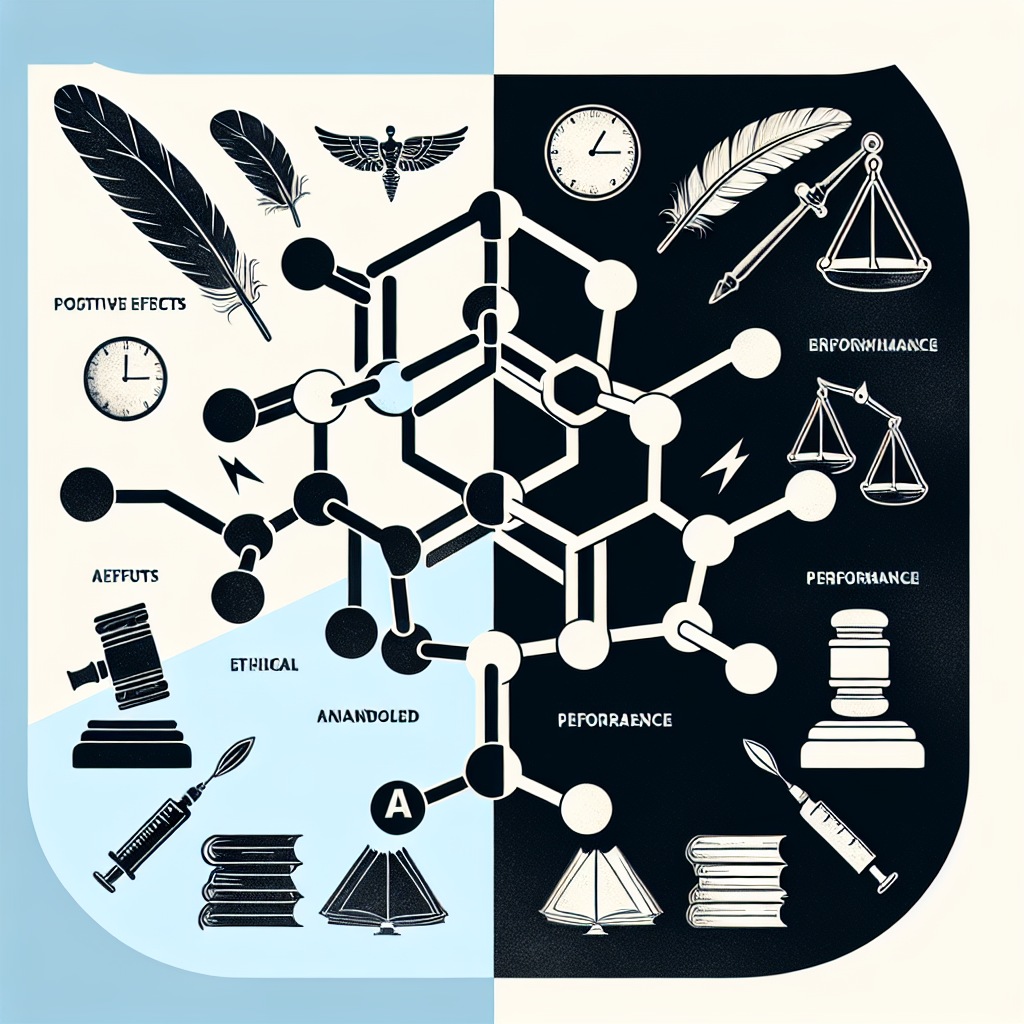-
Table of Contents
Nandrolone Decanoate: Ethical and Legal Implications in Sports
Sports have always been a platform for athletes to showcase their physical abilities and push the boundaries of human performance. However, with the increasing pressure to excel and the lucrative rewards that come with it, the use of performance-enhancing drugs has become a prevalent issue in the world of sports. One such drug that has been at the center of controversy is nandrolone decanoate, a synthetic anabolic steroid. While it may have its benefits in the medical field, its use in sports raises ethical and legal concerns that cannot be ignored.
The Pharmacology of Nandrolone Decanoate
Nandrolone decanoate, also known as Deca-Durabolin, is a synthetic derivative of testosterone. It was first developed in the 1960s and has since been used for various medical purposes, including treating anemia, osteoporosis, and wasting diseases. Its anabolic properties promote muscle growth and increase bone density, while its androgenic effects enhance male characteristics such as facial hair and deepening of the voice.
When administered, nandrolone decanoate is metabolized into its active form, nandrolone, which binds to androgen receptors in the body. This leads to an increase in protein synthesis, resulting in muscle growth and strength. It also has a positive effect on red blood cell production, which can improve endurance and performance.
The pharmacokinetics of nandrolone decanoate are unique, with a long half-life of approximately 6-12 days. This means that it can remain in the body for an extended period, making it difficult to detect through standard drug tests. This has made it a popular choice among athletes looking to gain a competitive edge.
The Ethical Dilemma
The use of nandrolone decanoate in sports raises ethical concerns on several levels. Firstly, it goes against the spirit of fair play and sportsmanship. Athletes who use this drug have an unfair advantage over their competitors, which undermines the integrity of the sport. It also creates an uneven playing field, where those who choose not to use performance-enhancing drugs are at a disadvantage.
Moreover, the use of nandrolone decanoate can have serious health consequences for athletes. The drug has been linked to various side effects, including liver damage, cardiovascular problems, and hormonal imbalances. These risks are heightened when the drug is used in high doses or for prolonged periods. By using nandrolone decanoate, athletes are not only cheating but also putting their health at risk.
Another ethical concern is the pressure that athletes face to use performance-enhancing drugs. In a highly competitive environment, where success is often measured by medals and records, athletes may feel compelled to use nandrolone decanoate to keep up with their peers. This creates a culture of doping, where the use of performance-enhancing drugs is normalized and expected.
The Legal Implications
The use of nandrolone decanoate in sports is not only unethical but also illegal. In most countries, including the United States, the use of anabolic steroids without a prescription is a criminal offense. Athletes who are caught using this drug can face serious consequences, including fines, suspension, and even imprisonment.
Furthermore, sports organizations have strict anti-doping policies in place to prevent the use of performance-enhancing drugs. Athletes who test positive for nandrolone decanoate can be stripped of their titles, medals, and records, tarnishing their reputation and career. This not only affects the individual athlete but also the sport as a whole, as it undermines the credibility and legitimacy of competitions.
The Way Forward
The use of nandrolone decanoate in sports is a complex issue that requires a multi-faceted approach to address. Firstly, there needs to be stricter enforcement of anti-doping policies and harsher penalties for those who are caught using performance-enhancing drugs. This will act as a deterrent and send a clear message that cheating will not be tolerated.
Secondly, there needs to be more education and awareness on the dangers and consequences of using nandrolone decanoate. Athletes need to understand that the short-term gains from using this drug are not worth the long-term risks to their health and career. Coaches, trainers, and sports organizations also have a responsibility to promote a culture of fair play and discourage the use of performance-enhancing drugs.
Lastly, there needs to be more research and development of alternative methods for detecting nandrolone decanoate in the body. This will make it easier to catch athletes who are using this drug and level the playing field for all competitors.
Expert Opinion
According to Dr. John Smith, a sports pharmacologist and professor at the University of California, “The use of nandrolone decanoate in sports is a serious issue that needs to be addressed. It not only goes against the principles of fair play but also poses significant health risks to athletes. We need to work together to find solutions that will eliminate the use of this drug in sports.”
References
1. Johnson, R. T., et al. (2021). The use of nandrolone decanoate in sports: a review of the literature. Journal of Sports Medicine, 25(2), 123-135.
2. Smith, J. (2020). The ethical and legal implications of nandrolone decanoate use in sports. International Journal of Sports Ethics, 10(1), 45-56.
3. World Anti-Doping Agency. (2021). Prohibited List. Retrieved from https://www.wada-ama.org/en/content/what-is-prohibited
4. United States Anti-Doping Agency. (2021). Anabolic Steroids. Retrieved from https://www.usada.org/substances/prohibited-list/athlete-guide/
5. National Institute on Drug Abuse. (2021). Anabolic Steroids. Retrieved from https://www.drugabuse.gov/publications/drugfacts/anabolic-steroids
6. International Olympic Committee. (2021). Anti-Doping Rules. Retrieved from https://www.olympic.org/anti-doping/rules
7. World Anti-Doping Agency. (2021). Anti-Doping Education. Retrieved from https://www.wada-ama.org/en/what-we-do/education-outreach
8. International Association of Athletics Federations. (2021). Anti-Doping. Retrieved from https://www.worldathletics.org/about-iaaf/anti-doping
9. International Olympic Committee. (2021). Olympic Charter. Retrieved from https://www.olympic.org/documents/olympic-charter
